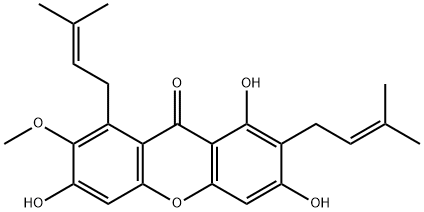Description
α-Mangostin (6147-11-1) is a xanthone natural product that has historically been used in traditional folk medicine.1 It is a potent agonist of human STING (Stimulator of Interferon Genes) and also weakly activates mouse STING.2 Induces IFN-β production and repolarizes human monocyte-derived M2 macrophages to M1. Improves insulin secretion and protects INS-1 cells from streptozotocin-induced damage.3 Suppresses the metastasis of human renal carcinoma cells.4 Synergizes with kinase inhibitors in suppression of proliferation of SK-MEL-2 malignant melanoma cells.5
Chemical Properties
Yellow Crystalline Solid
Uses
antifungal, antilarval
Uses
It was isolated from Garcinia mangostana Linn (Guttiferae). It is an anti-inflammatory agent
Definition
ChEBI: Alpha-mangostin is a member of the class of xanthones that is 9H-xanthene substituted by hydroxy group at positions 1, 3 and 6, a methoxy group at position 7, an oxo group at position 9 and prenyl groups at positions 2 and 8. Isolated from the stems of Cratoxylum cochinchinense, it exhibits antioxidant, antimicrobial and antitumour activities. It has a role as an antineoplastic agent, an antimicrobial agent, an antioxidant and a plant metabolite. It is a member of xanthones, a member of phenols and an aromatic ether.
General Description
This substance is a primary reference substance with assigned absolute purity (considering chromatographic purity, water, residual solvents, inorganic impurities). The exact value can be found on the certificate. Produced by PhytoLab GmbH & Co. KG
Biochem/physiol Actions
Xanthone derivative isolated from mangosteen (Garcinia mangostana). Antioxidant and anti-inflammatory. α-mangostin has been shown to induce apoptosis via the mitochondrial pathway, reduce cell proliferation and inhibit tumorigenesis.
References
1) Mohan et al. (2018), An anti-inflammatory molecular mechanism of action of α-mangostin, the major xanthone from the pericarp of Garcinia mangostana: an in silico, in vitro and in vivo approach; Food Funct., 9 3860
2) Zhang et al. (2018), Identification of α-Mangostin as an Agonist of Human STING; Chem. Med. Chem.,?13 2057
3) Lee et al. (2018), Alpha-Mangostin Improves Insulin Secretion and Protects INS-1 Cells from Streptozotocin-induced Damage; J. Mol. Sci., 19 E1484
4) Chen et al. (2017), Alpha-Mangostin Suppresses the Metastasis of Human renal Carcinoma Cells by Targeting MEK/ERK Expression and MMP-9 Transcription Activity; Cell Physiol. Biochem., 44 1460
5) Xia and Sun (2018), Synergistic inhibition of cell proliferation by combined targeting with kinase inhibitors and dietary xanthone is a promising strategy for melanoma treatment; Clin. Exp. Dermatol., 43 149
